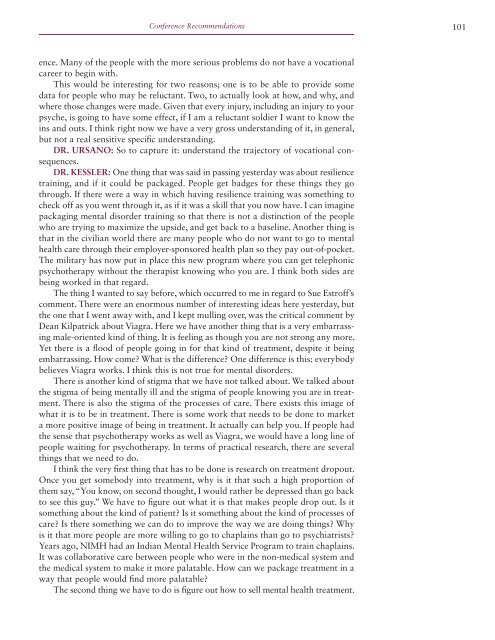stigma and barriers to care - Uniformed Services University of the ...
stigma and barriers to care - Uniformed Services University of the ...
stigma and barriers to care - Uniformed Services University of the ...
Create successful ePaper yourself
Turn your PDF publications into a flip-book with our unique Google optimized e-Paper software.
Conference Recommendations 101<br />
ence. Many <strong>of</strong> <strong>the</strong> people with <strong>the</strong> more serious problems do not have a vocational<br />
<strong>care</strong>er <strong>to</strong> begin with.<br />
This would be interesting for two reasons; one is <strong>to</strong> be able <strong>to</strong> provide some<br />
data for people who may be reluctant. Two, <strong>to</strong> actually look at how, <strong>and</strong> why, <strong>and</strong><br />
where those changes were made. Given that every injury, including an injury <strong>to</strong> your<br />
psyche, is going <strong>to</strong> have some effect, if I am a reluctant soldier I want <strong>to</strong> know <strong>the</strong><br />
ins <strong>and</strong> outs. I think right now we have a very gross underst<strong>and</strong>ing <strong>of</strong> it, in general,<br />
but not a real sensitive specific underst<strong>and</strong>ing.<br />
DR. URSANO: So <strong>to</strong> capture it: underst<strong>and</strong> <strong>the</strong> trajec<strong>to</strong>ry <strong>of</strong> vocational consequences.<br />
DR. KESSLER: One thing that was said in passing yesterday was about resilience<br />
training, <strong>and</strong> if it could be packaged. People get badges for <strong>the</strong>se things <strong>the</strong>y go<br />
through. If <strong>the</strong>re were a way in which having resilience training was something <strong>to</strong><br />
check <strong>of</strong>f as you went through it, as if it was a skill that you now have. I can imagine<br />
packaging mental disorder training so that <strong>the</strong>re is not a distinction <strong>of</strong> <strong>the</strong> people<br />
who are trying <strong>to</strong> maximize <strong>the</strong> upside, <strong>and</strong> get back <strong>to</strong> a baseline. Ano<strong>the</strong>r thing is<br />
that in <strong>the</strong> civilian world <strong>the</strong>re are many people who do not want <strong>to</strong> go <strong>to</strong> mental<br />
health <strong>care</strong> through <strong>the</strong>ir employer-sponsored health plan so <strong>the</strong>y pay out-<strong>of</strong>-pocket.<br />
The military has now put in place this new program where you can get telephonic<br />
psycho<strong>the</strong>rapy without <strong>the</strong> <strong>the</strong>rapist knowing who you are. I think both sides are<br />
being worked in that regard.<br />
The thing I wanted <strong>to</strong> say before, which occurred <strong>to</strong> me in regard <strong>to</strong> Sue Estr<strong>of</strong>f’s<br />
comment. There were an enormous number <strong>of</strong> interesting ideas here yesterday, but<br />
<strong>the</strong> one that I went away with, <strong>and</strong> I kept mulling over, was <strong>the</strong> critical comment by<br />
Dean Kilpatrick about Viagra. Here we have ano<strong>the</strong>r thing that is a very embarrassing<br />
male-oriented kind <strong>of</strong> thing. It is feeling as though you are not strong any more.<br />
Yet <strong>the</strong>re is a flood <strong>of</strong> people going in for that kind <strong>of</strong> treatment, despite it being<br />
embarrassing. How come What is <strong>the</strong> difference One difference is this: everybody<br />
believes Viagra works. I think this is not true for mental disorders.<br />
There is ano<strong>the</strong>r kind <strong>of</strong> <strong>stigma</strong> that we have not talked about. We talked about<br />
<strong>the</strong> <strong>stigma</strong> <strong>of</strong> being mentally ill <strong>and</strong> <strong>the</strong> <strong>stigma</strong> <strong>of</strong> people knowing you are in treatment.<br />
There is also <strong>the</strong> <strong>stigma</strong> <strong>of</strong> <strong>the</strong> processes <strong>of</strong> <strong>care</strong>. There exists this image <strong>of</strong><br />
what it is <strong>to</strong> be in treatment. There is some work that needs <strong>to</strong> be done <strong>to</strong> market<br />
a more positive image <strong>of</strong> being in treatment. It actually can help you. If people had<br />
<strong>the</strong> sense that psycho<strong>the</strong>rapy works as well as Viagra, we would have a long line <strong>of</strong><br />
people waiting for psycho<strong>the</strong>rapy. In terms <strong>of</strong> practical research, <strong>the</strong>re are several<br />
things that we need <strong>to</strong> do.<br />
I think <strong>the</strong> very first thing that has <strong>to</strong> be done is research on treatment dropout.<br />
Once you get somebody in<strong>to</strong> treatment, why is it that such a high proportion <strong>of</strong><br />
<strong>the</strong>m say, “You know, on second thought, I would ra<strong>the</strong>r be depressed than go back<br />
<strong>to</strong> see this guy.” We have <strong>to</strong> figure out what it is that makes people drop out. Is it<br />
something about <strong>the</strong> kind <strong>of</strong> patient Is it something about <strong>the</strong> kind <strong>of</strong> processes <strong>of</strong><br />
<strong>care</strong> Is <strong>the</strong>re something we can do <strong>to</strong> improve <strong>the</strong> way we are doing things Why<br />
is it that more people are more willing <strong>to</strong> go <strong>to</strong> chaplains than go <strong>to</strong> psychiatrists<br />
Years ago, NIMH had an Indian Mental Health Service Program <strong>to</strong> train chaplains.<br />
It was collaborative <strong>care</strong> between people who were in <strong>the</strong> non-medical system <strong>and</strong><br />
<strong>the</strong> medical system <strong>to</strong> make it more palatable. How can we package treatment in a<br />
way that people would find more palatable<br />
The second thing we have <strong>to</strong> do is figure out how <strong>to</strong> sell mental health treatment.




